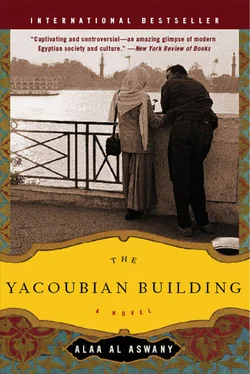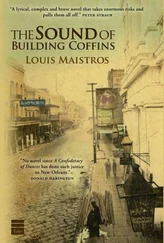Alaa Al Aswany - The Yacoubian Building
Здесь есть возможность читать онлайн «Alaa Al Aswany - The Yacoubian Building» весь текст электронной книги совершенно бесплатно (целиком полную версию без сокращений). В некоторых случаях можно слушать аудио, скачать через торрент в формате fb2 и присутствует краткое содержание. Год выпуска: 2006, ISBN: 2006, Издательство: Adobe Acrobat eBook Reader, Жанр: Современная проза, на английском языке. Описание произведения, (предисловие) а так же отзывы посетителей доступны на портале библиотеки ЛибКат.
- Название:The Yacoubian Building
- Автор:
- Издательство:Adobe Acrobat eBook Reader
- Жанр:
- Год:2006
- ISBN:978-0-06-087813-9
- Рейтинг книги:5 / 5. Голосов: 1
-
Избранное:Добавить в избранное
- Отзывы:
-
Ваша оценка:
- 100
- 1
- 2
- 3
- 4
- 5
The Yacoubian Building: краткое содержание, описание и аннотация
Предлагаем к чтению аннотацию, описание, краткое содержание или предисловие (зависит от того, что написал сам автор книги «The Yacoubian Building»). Если вы не нашли необходимую информацию о книге — напишите в комментариях, мы постараемся отыскать её.
The Yacoubian Building — читать онлайн бесплатно полную книгу (весь текст) целиком
Ниже представлен текст книги, разбитый по страницам. Система сохранения места последней прочитанной страницы, позволяет с удобством читать онлайн бесплатно книгу «The Yacoubian Building», без необходимости каждый раз заново искать на чём Вы остановились. Поставьте закладку, и сможете в любой момент перейти на страницу, на которой закончили чтение.
Интервал:
Закладка:
In order to realize this dream, Taha has courted the police officers in the district until they are all his friends, both those of the Kasr el Nil police station and of the Kotzika substation that belongs to it. From them, Taha has learned all the details relating to the admission tests for the police and found out too about the twenty thousand pounds that the well-to-do pay as a bribe to ensure their children’s acceptance into the college (and how he wishes he possessed such a sum!). In order to realize this dream, Taha el Shazli has also put up with the meanness and the arrogance of the building’s inhabitants.
Since he was little he had helped his father run errands for people, and when his intelligence and academic excellence manifested themselves, the inhabitants reacted in different ways. Some encouraged him to study, gave him generous gifts, and prophesied a glorious future for him. Others, however (and there were many of these), were somehow disturbed by the idea of “the high-flying doorkeeper’s son” and tried to convince his father to enroll him in vocational training as soon as he finished intermediary school “so that he can learn a trade that will be of use to you and to himself,” as they would say to elderly “uncle” Shazli, with a show of concern for his welfare. When Taha enrolled in general secondary school and continued to do well, they would send for him on exam days and entrust him with difficult tasks that would take a long time, tipping him generously to tempt him, while concealing a malign desire to keep him from his studies. Taha would accept these tasks because of his need for cash but would go on wearing himself out with study, often going one or two days without sleep.
When the general secondary exam results came out and he obtained a higher score than the children of many in the building, the grumblers started to talk openly. One of them would run into another in front of the elevator and ask him sarcastically if he had offered his congratulations to the doorkeeper on his son’s high marks; then he would add bitingly that the doorkeeper’s son would soon join the Police Academy and graduate as an officer with two stars on his epaulettes. At this point the other person would candidly reveal his annoyance, first praising Taha’s character and his hard work, then going on to say in a serious tone of voice (as though he had the general principle and not the individual in mind) that jobs in the police, the judiciary, and sensitive positions in general should be given only to the children of people who were somebody because the children of doorkeepers, laundrymen, and such like, if they attained any authority, would use it to compensate for the inferiority complexes and other neuroses they had acquired during their early childhood. Then he would bring his speech to an end by cursing Abd el Nasser, who had introduced free education, or quote as authority the saying of the Prophet — God bless him and grant him peace — “Teach not the children of the lowly!”
These same residents started picking on Taha when the results appeared and finding fault with him for the most trivial of reasons, such as washing the car and forgetting to put the floormats back in place, or being a few minutes late in the performance of an errand to somewhere far away, or buying ten things for them from the market and forgetting one. They would insult him deliberately and unmistakably in order to push him into responding that he would not put up with such insults because he was an educated person, which would be their golden opportunity to announce to him the truth — that here he was a mere doorkeeper, no more and no less, and if he didn’t like his job he should leave it to someone who needed it. But Taha never gave them that opportunity. He would meet their outbursts with silence, a bowed head, and a slight smile, his handsome brown face at these moments giving the impression that he did not agree with what was directed at him and that it was entirely in his power to rebut the insult but that respect for the other’s greater age prevented him from so doing.
This was one of a number of fall-back positions, tantamount to defensive tactics, that Taha used under difficult circumstances in order to express what he felt while at the same time avoiding problems, positions that had initially been a matter of acting for him but which he soon performed sincerely and as though they were the truth. For example, he did not like to sit on the doorkeeper’s bench so that he had to get up respectfully for every resident, and if he was sitting on the bench and he saw a resident coming, he would busy himself with something that would obviate his duty to stand up. Similarly, he was accustomed to addressing the residents with a carefully calculated modicum of respect and to treating them as an employee would his superior and not as a servant his master. As for the children of the residents who were close to him in age, he treated them as complete equals. He would call them by their first names and converse and play around with them like close friends, borrowing from them schoolbooks that he might not actually need in order to remind them that despite his position as a doorkeeper he was their colleague when it came to study.
These were the commonplaces of his day-to-day life — poverty, back-breaking hard work, the arrogance of the residents, and the five-pound note, always folded, that his father bestowed on him every Saturday and on which he practiced every stratagem to make last the whole week; the smooth, warm hand of a resident extended lazily and graciously from a car window to give him a tip (at the sight of which he had to raise his hand in a military-style salute and thank his benefactor enthusiastically and audibly); that look, impertinent and full of smugness or covertly sympathetic and tolerant, inspired by embarrassment at the “issue,” which he noted in the eyes of his school friends when they visited him and discovered that he lived in the doorkeeper’s quarters “up on the roof ”; that hateful, embarrassing question “Are you the doorkeeper?” that strangers to the building addressed to him; and the deliberate slowing down of the residents as they entered the building so that he would hurry to relieve them of whatever they were carrying no matter how light or unimportant.
It is with annoyances such as these that the day passes, but when Taha gets into bed at the end of the evening, it is always in a state of purity and with his ablutions made, after he has first performed the evening prayer, plus superrogatory odd and even series of prostrations. Then he stares long into the darkness of the room, gradually soaring until he beholds himself in his mind’s eye as a police officer strutting proudly in his beautiful uniform with the brass stars gleaming on his shoulder and the impressive government-issue pistol dangling from his belt. He imagines that he has married his sweetheart Busayna el Sayed and that they have moved to a suitable apartment in an up-market district far from the noise and dirt of the roof.
He firmly believed that God would make all his dreams come true — first of all because he made the utmost effort to honor God’s commandments, observing the obligatory prayers and avoiding major sins (and God had given to the observant in a noble verse of the Qur’an the good news that Had the people of the cities believed and been God-fearing, We would have opened upon them blessings from heaven and earth ) and second because he had the highest expectations of God’s good intentions (given that the Almighty and Glorious had said, in words revealed to the Prophet, “I am according to my slaves’ expectations of me: if good, then good, and if bad, then bad”). And see — God had fulfilled his promise and granted him success in the general secondary exams, and he had passed, praise God, all the tests for the Police Academy. All that remained for him to do was the character interview, which he would pass that same day, God willing.
Читать дальшеИнтервал:
Закладка:
Похожие книги на «The Yacoubian Building»
Представляем Вашему вниманию похожие книги на «The Yacoubian Building» списком для выбора. Мы отобрали схожую по названию и смыслу литературу в надежде предоставить читателям больше вариантов отыскать новые, интересные, ещё непрочитанные произведения.
Обсуждение, отзывы о книге «The Yacoubian Building» и просто собственные мнения читателей. Оставьте ваши комментарии, напишите, что Вы думаете о произведении, его смысле или главных героях. Укажите что конкретно понравилось, а что нет, и почему Вы так считаете.












